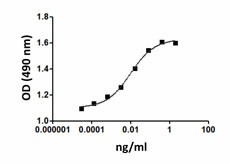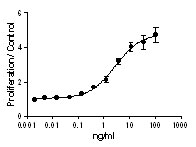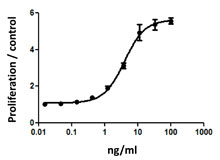- Regulatory Status
- RUO
- Other Names
- Granulocyte/macrophage-colony stimulating factor, CSF-α, Pluripoietin-α, Eosinophil colony stimulating factor (Eo-CSF), Burst promoting activity (BPA)
- Ave. Rating
- Submit a Review
- Product Citations
- 49 publications
| Cat # | Size | Price | Quantity Check Availability | Save | ||
|---|---|---|---|---|---|---|
| 576308 | 500 µg | 1992 CHF | ||||
| 576302 | 10 µg | 147 CHF | ||||
| 576304 | 25 µg | 253 CHF | ||||
| 576306 | 100 µg | 762 CHF | ||||
GM-CSF is a hematopoietic factor that is produced by T cells, macrophages, fibroblasts and endothelial cells. This multifunctional cytokine stimulates progenitor cells of neutrophils, eosinophils and macrophages. GM-CSF is also a differentiation and activating factor for granulocytic and monocytic cells.
Product DetailsProduct Details
- Source
- Mouse GM-CSF, amino acids Ala18-Lys141 (Accession # NM_009969) was expressed in E. coli.
- Molecular Mass
- The 125 amino acid N-terminal methionylated recombinant protein has a predicted molecular mass of 14.2 kDa. The DTT-reduced protein migrates at approximately 13 kDa and the non-reduced protein migrates at approximately 11kDa by SDS-PAGE.
- Purity
- Purity is >98%, as determined by Coomassie stained SDS-PAGE.
- Formulation
- 0.22 µm filtered protein solution is in 10mM NaH2PO4, 150mM NaCl, pH 7.2.
- Endotoxin Level
- Endotoxin level is <0.1 EU/µg (<0.01ng/µg) protein as determined by the LAL method.
- Concentration
- 10 and 25 µg sizes are bottled at 200 µg/mL. 100 µg size and larger sizes are lot-specific and bottled at the concentration indicated on the vial. To obtain lot-specific concentration and expiration, please enter the lot number in our Certificate of Analysis online tool.
- Storage & Handling
- Unopened vial can be stored between 2°C and 8°C for up to 2 weeks, at -20°C for up to six months, or at -70°C or colder until the expiration date. For maximum results, quick spin vial prior to opening. The protein can be aliquoted and stored at -20°C or colder. Stock solutions can also be prepared at 50 - 100 µg/mL in appropriate sterile buffer, carrier protein such as 0.2 - 1% BSA or HSA can be added when preparing the stock solution. Aliquots can be stored between 2°C and 8°C for up to one week and stored at -20°C or colder for up to 3 months. Avoid repeated freeze/thaw cycles.
- Activity
- The ED50 is <0.05 ng/ml, corresponding to a specific activity >2x107 units/mg.
- Application
-
Bioassay
- Recommended Usage
-
Use when high specific biological activity is required.
- Application Notes
-
BioLegend carrier-free recombinant proteins provided in liquid format are shipped on blue-ice. Our comparison testing data indicates that when handled and stored as recommended, the liquid format has equal or better stability and shelf-life compared to commercially available lyophilized proteins after reconstitution. Our liquid proteins are verified in-house to maintain activity after shipping on blue ice and are backed by our 100% satisfaction guarantee. If you have any concerns, contact us at tech@biolegend.com.
-
Application References
(PubMed link indicates BioLegend citation) - Product Citations
-
Antigen Details
- Structure
- cytokine
- Distribution
-
T cells, monocytes/macrophages, fibroblasts, endothelial cells, mast cells
- Function
- Synergistic with IL-1, IL-3, G-CSF; E21R competitive antagonist for receptor binding; stored in ECM with heparan sulfate proteoglycans
- Interaction
- Granulocyte/macrophage/erythroid/megakaryocytic progenitors, myeloblasts, monoblasts
- Ligand/Receptor
- Heterodimer GM-CSFR µ subunit (CDw116); β-subunit (CDw131) in common with IL-3R, IL-5R
- Bioactivity
- Growth/development granulocyte/macrophage progenitors; differentiates myeloblasts/monoblasts; synergizes with Epo proliferation of erythroid/megakaryocytic progenitors
- Cell Type
- Embryonic Stem Cells, Hematopoietic stem and progenitors
- Biology Area
- Cell Biology, Stem Cells
- Molecular Family
- Cytokines/Chemokines, Growth Factors
- Antigen References
-
1. Fitzgerald K, et al. Eds. 2001. The Cytokine FactsBook. Academic Press San Diego.
2. Demetri G, et al. 1991. Blood 78:2791.
3. Fan D, et al. 1991. In vivo 5:571.
4. Negrin R, et al. 1992. Adv. Pharmacol. 23:263. - Gene ID
- 12981 View all products for this Gene ID
- UniProt
- View information about GM-CSF on UniProt.org
Related FAQs
- Why choose BioLegend recombinant proteins?
-
• Each lot of product is quality-tested for bioactivity as indicated on the data sheet.
• Greater than 95% Purity or higher, tested on every lot of product.
• 100% Satisfaction Guarantee for quality performance, stability, and consistency.
• Ready-to-use liquid format saves time and reduces challenges associated with reconstitution.
• Bulk and customization available. Contact us.
• Learn more about our Recombinant Proteins. - How does the activity of your recombinant proteins compare to competitors?
-
We quality control each and every lot of recombinant protein. Not only do we check its bioactivity, but we also compare it against other commercially available recombinant proteins. We make sure each recombinant protein’s activity is at least as good as or better than the competition’s. In order to provide you with the best possible product, we ensure that our testing process is rigorous and thorough. If you’re curious and eager to make the switch to BioLegend recombinants, contact your sales representative today!
- What is the specific activity or ED50 of my recombinant protein?
-
The specific activity range of the protein is indicated on the product datasheets. Because the exact activity values on a per unit basis can largely fluctuate depending on a number of factors, including the nature of the assay, cell density, age of cells/passage number, culture media used, and end user technique, the specific activity is best defined as a range and we guarantee the specific activity of all our lots will be within the range indicated on the datasheet. Please note this only applies to recombinants labeled for use in bioassays. ELISA standard recombinant proteins are not recommended for bioassay usage as they are not tested for these applications.
- Have your recombinants been tested for stability?
-
Our testing shows that the recombinant proteins are able to withstand room temperature for a week without losing activity. In addition the recombinant proteins were also found to withstand four cycles of freeze and thaw without losing activity.
- Does specific activity of a recombinant protein vary between lots?
-
Specific activity will vary for each lot and for the type of experiment that is done to validate it, but all passed lots will have activity within the established ED50 range for the product and we guarantee that our products will have lot-to-lot consistency. Please conduct an experiment-specific validation to find the optimal ED50 for your system.
- How do you convert activity as an ED50 in ng/ml to a specific activity in Units/mg?
-
Use formula Specific activity (Units/mg) = 10^6/ ED50 (ng/mL)

 Login / Register
Login / Register 



















Follow Us